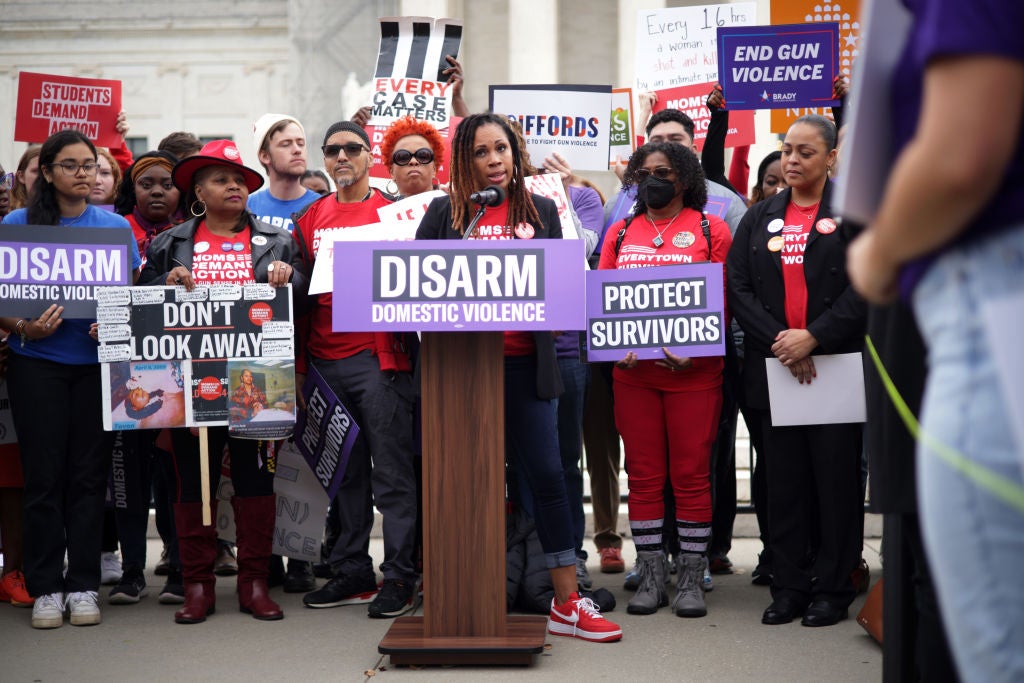
In every election cycle, a familiar question emerges: how do we energize Black and brown voters? And while the question can often be a reductive one, it’s a critical mission. Black women and other women of color will be an influential force next November— as they have been for every recent presidential election. More than two-thirds of Black women turned out to vote in 2020 — the third highest rate of any race-gender group.
Despite our diverse experiences, strategists often box women of color into a one-size-fits-all narrative, ignoring the influences of individual cultures, class, and location. Still, though, there are undeniable trends in what women of color might demand out of their representatives. Chiefly among these priorities are the passage of common-sense, lifesaving gun safety laws.
I’ve traveled all over the country— red states and blue states, cities, suburbs, and rural communities — and I’ve seen how fed up people are with the devastating impacts of gun violence. Gun violence affects every corner of our society, but for women of color, especially Black women like myself, the impact is uniquely distinct and deeply felt.
I got into this work because I’ve felt the dread of sending your child to school after another tragedy with a pit in your stomach. As a mother to Black children, I know that feeling doesn’t stop there. Guns are the number one killer of children and teens in America, and Black youth are bearing the brunt. For us, it goes beyond the mass shootings that are in the headlines. It’s the daily instances of gun violence that never make the news. It’s the deadly police shootings that are three times more likely to be committed against Black people than white people. And it’s the systemic underinvestment in our communities that leave us vulnerable to violent crime.
When you consider that Black youth are 17 times more likely than their white peers to die by gun homicide, it’s obvious why Black women want politicians who will prioritize the safety of their children. White supremacy and gun violence are both deadly epidemics in our country, and I’m leading our movement with their intersection at the forefront.
There are other dangers that weak gun safety laws pose to women of color specifically, including the terrifying link between domestic abuse and firearm use. Research shows it’s five times more likely an abuser will kill his female victim if he has access to a gun. And women of color face barriers accessing essential services that could reduce the risk of lethal violence. This is especially true for Indigenous, Black, and Latina women, who also have disproportionately high homicide rates, where more often than not, the perpetrator is an abusive partner.
But our desire for gun safety runs deeper than those statistics. My own activism started young because of my mother’s safeguarding presence in our neighborhood. She instilled an early belief in me that “we’re not okay unless everyone is okay.” Women of color have long been the vanguards for safety in their communities. Long before organized efforts like Moms Demand Action, we did this work by building networks to look after one another, keeping watch over each other’s children, and engaging in direct conflict intervention to protect our loved ones.
Throughout my time in this movement, one thing has become clear: this is all so preventable. There’s common-sense legislation like an assault weapons ban, strong background checks, and extreme risk laws. There are localized violence intervention programs paired with significant reinvestment for the communities most impacted. There’s accountability to be demanded from the gun industry, which gets away with murder. We have the solutions — what we need now are politicians who understand this crisis and have the courage to actually do something about it.
I know folks are tired of hearing that voting is the answer, but I want women like me to realize the enormous power that we can wield if we demand that candidates adopt gun safety in their platforms. Because the solutions I just mentioned have been proven to save lives, and prevent families from experiencing unimaginable tragedies.
We are at a tipping point. The 2024 election presents a crucial opportunity to seize on our growing momentum. With the NRA at a dead end, our movement stronger than ever before, and the Biden-Harris Administration leading with gun safety from the White House, impactful solutions are within reach.
Voting is not just an easy answer; it is an essential tool to influence change. I look at women we’ve elected like Representative Lucy McBath, a Moms Demand Action alumna and Black mother whose own son was taken by gun violence, and I’m in awe at how she is fighting tooth and nail to pass common-sense gun safety legislation. It’s that kind of dedication to keeping families safe that gives me hope.
At the end of the day, candidates need our support more than we need them. Without the backing of women of color, they will lose their seats. No more pandering for votes, no more staged photo-ops. Let’s stand in solidarity with each other and make it clear that we want a safer future for our families.
We can’t — and won’t — settle for anything less.

